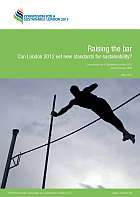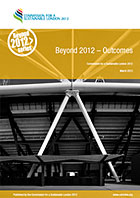
The Commission for a Sustainable London 2012, the independent body set up to monitor and assure the sustainability of the London 2012 programme, has today published its 2009 Annual Review of the sustainability of the London 2012 programme.
The review, entitled Raising the bar, praises the work done so far by the ODA and LOCOG, the two main bodies delivering the London 2012 Games. The achievements to date of these two organisations mean that the London 2012 Games and venues are on track to deliver the sustainability objectives set out in the London 2012 Sustainability Plan.
The Commission has been particularly impressed with the ground breaking work in the areas of food, waste and carbon. The Commission’s in-depth reports into these areas are available to download
The innovative work done by the ODA and LOCOG in these areas provides a further opportunity for UK business to benefit from the Games. If the knowledge and best practice from London 2012 is captured and consistently disseminated throughout the public and private sectors then it will help UK industries to become world leading in areas such as managing embodied carbon.
Capturing this legacy of knowledge will be vital, especially as some of the delivery bodies begin to scale down their operations before or immediately after the Games. The ODA has started a programme to capture lessons learnt but it is important to do this across the whole London 2012 programme.
In terms of the legacy for the Olympic Park the Commission looks forward to reviewing the revised Legacy Master Plan Framework later in 2010 and to seeing how the promise of the Olympic Park as a ‘blueprint for sustainable living’ will be realised.
With just over two years to go before the “inspirational power of the Games” moves to Rio, it is vital that the London 2012 programme continues to deliver.
By the time the keys to the Olympic Park are handed over to Olympic Park Legacy Company in 2013, the Commission would hope that:
- The sustainability objectives delivered by the ODA will be common practice in the construction industry and mandatory for all major public sector construction
- The UK construction industry will have adopted targets for reducing embodied carbon impacts and will have clear guidance on how to do this
- A clear definition of “blueprint for sustainable living” will be developed for the Olympic Park, in terms of the standards expected of developers, the way in which people will live differently and how they will be encouraged to do so
- Plans will be in place for the Olympic Park to become a zero carbon development area by 2016
- Plans will be in place for substantial development of organic waste facilities in East London to supply renewable fuel for the Olympic Park and other developments
- There will be a step change in the major events industry that enables measurable and assured improvements in sustainability
- Athletes, officials, spectators and TV viewers will recall London 2012 as being distinctive for its sustainability
